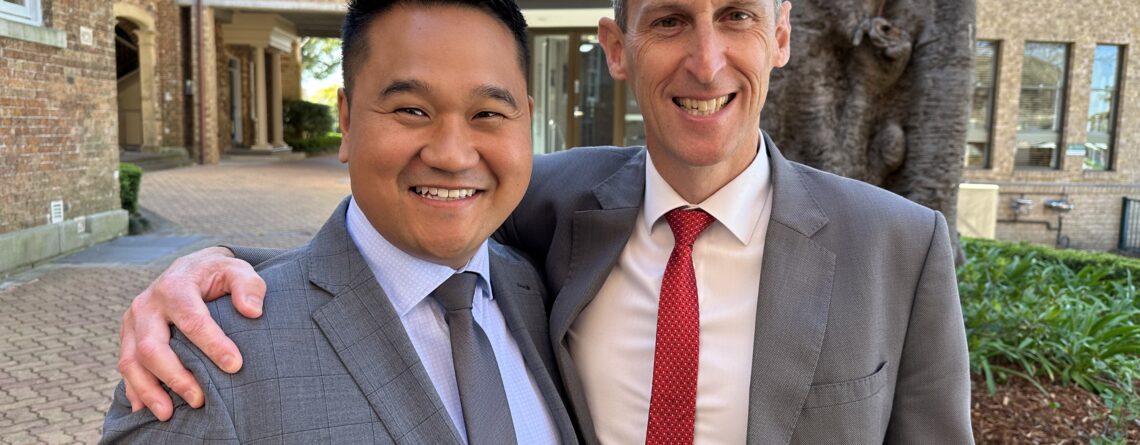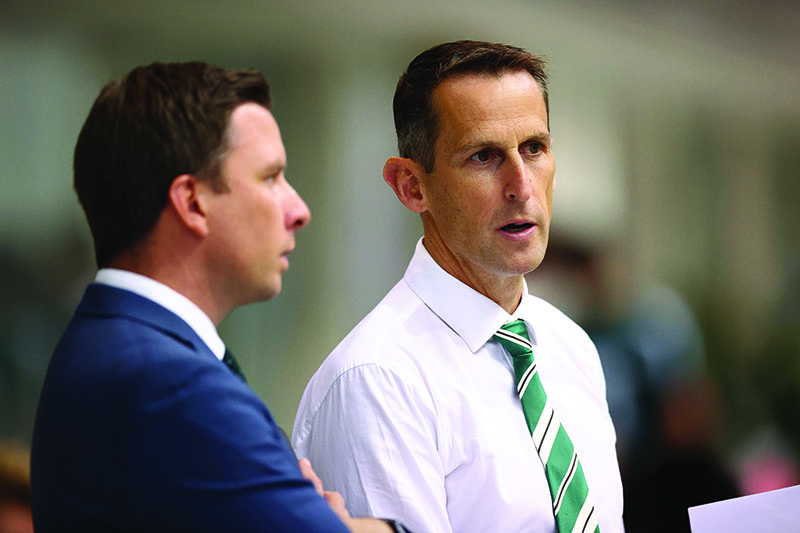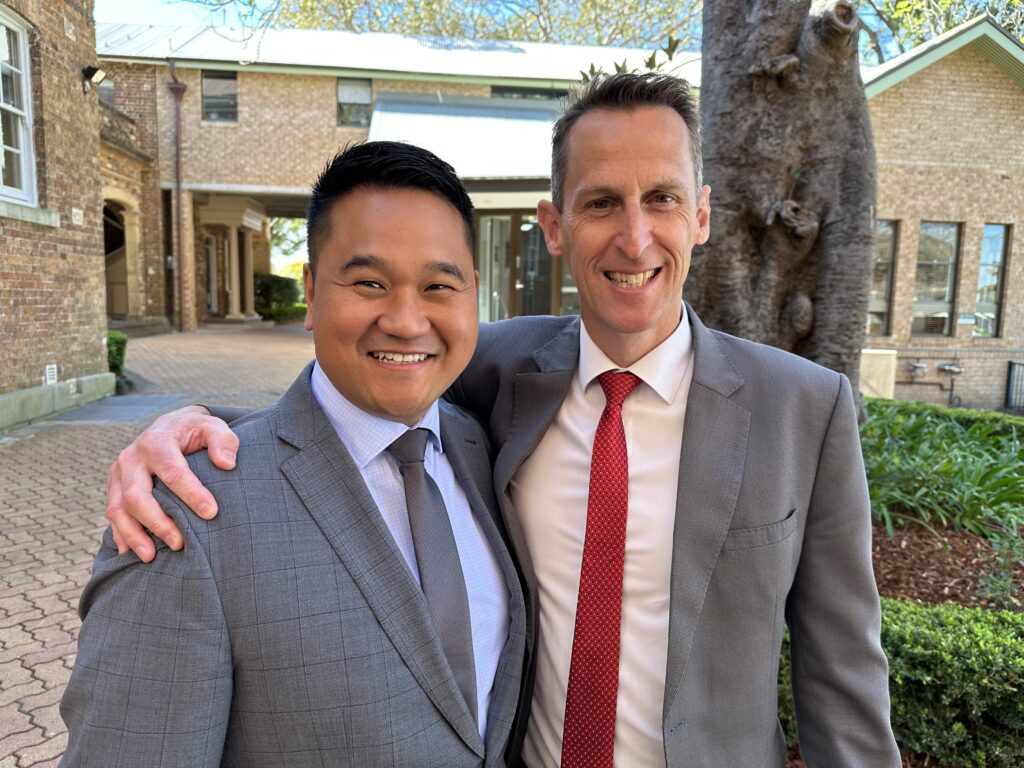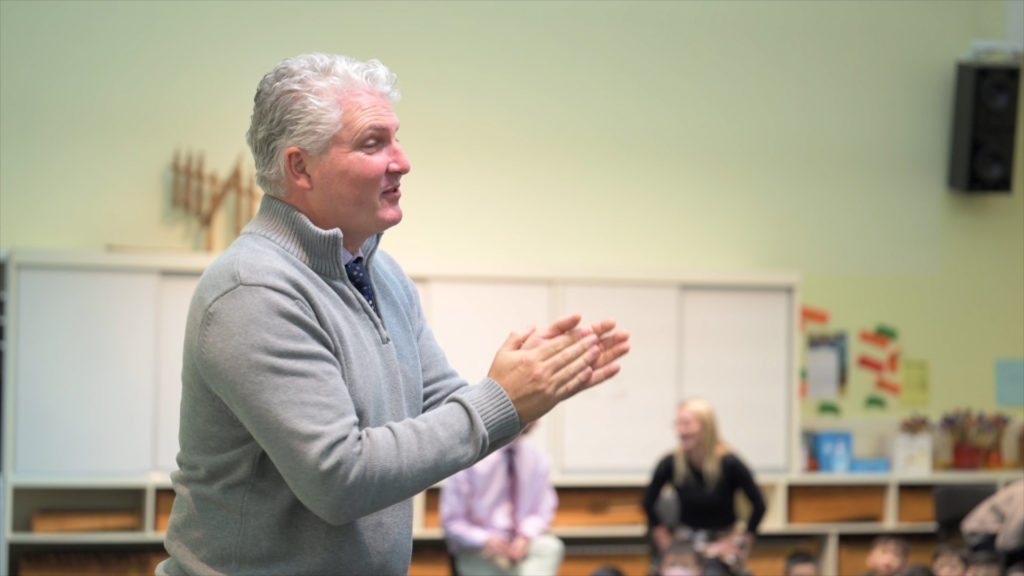How students grow into teachers
“Longevity is the key” to good relationships
If James Leckie ever feels he has spent his entire life at Trinity, well … he just about has.
He joined the School as an eight-year-old, and four decades later he is still here. He has never left. In all those years he has either been a student or a teacher.
He is a prime example of an educator who has both received and passed on the baton of leadership at Trinity.
The Trinity teachers who ignited his passion for education eventually became his colleagues and then his friends; they still are.
In turn, he has inspired students who have now become his colleagues and friends.
Doubtless the same will happen to some of them, as the circle completes and repeats. The process occurs over decades but takes place before our very eyes.
Mr Leckie is one of a dozen teachers on permanent staff (along with more than 120 working as casuals) who were also students at Trinity. He believes continuity and length of service are key to Trinity’s ambition to grow good men and nurture character.
“Longevity allows you to invest in relationships,” he said.
“Teachers can be phenomenal in terms of their knowledge of the curriculum, and the theory and the evidence of how to teach well, but I think the biggest part about teaching is relationships.
“You’re learning how to get the best out of kids; character development is the most important thing.
“Boys want to work hard for people they respect. So, if you can form those relationships, no classroom management is required.
“The people who have had the biggest impact on my life are people who have served huge amounts of time here.”
He cites as examples Mark Hatton-Ward (a Trinity staffer from 1986-2021) – “my Year 7 science teacher and still one of my best friends today”; Keith Dobbs (1977-80, 1982-2015) – “Sportsmaster before me and a friend I still regularly have a coffee with”; Rob Scott (1980-83, 1987-2007) and Keith Sandars (1952-86) – “both told me about Jesus for the first time and I became a Christian through this place”; and Michael Spratt (1995-2021) – “best man at my wedding”.
“Those people taught me so many different things that enabled me to grow.”
He also stressed the value of the continuity of the School’s Christian foundations.
“Being able to tell people about Jesus unashamedly in your classroom, in your sport, is incredibly valuable. There are not a lot of schools where you can do that any more,” he said.
“There’s a breadth of opportunities here. I love the all-round education, I love working with the boys, but most of all I love the opportunity to tell them about Jesus.”
Mr Leckie, who started at Trinity aged eight in 1982, was School Vice Captain in 1993. During his tertiary studies in Education, he was employed as a casual coach in swimming and cricket, then as a tutor, before starting full time as a Maths teacher in 1998, following his graduation from tertiary study.
He is currently Director of Enrolments but has had many roles, including Sportsmaster, Acting Master of the Middle School, and Master in Charge of Swimming—he was Captain of Swimming in his final year, and has now attended 40 CAS Championships in a row as either a swimmer or coach.
One of his students who has now become a Trinity teaching colleague is Head of Economics and 2004 School Captain, Kai Ikeuchi.
“James was one of the most inspirational teachers for me, and now I get to call him a friend,” he said.
“Before it was teacher and student, now it’s colleague and friend. It’s those developments in growth and friendships that I think are great.
“All teachers are terrific, but I think there’s that extra connection of transferring Trinity traditions and generational knowledge.
“For me, relationships are built outside as well as inside the classroom. That’s one of the things Trinity does well, allowing us to take on things like coaching the second XV. Those relationships I build make my classroom practice a lot easier.
“That helps you identify what the students’ needs are and then helping them.”
Mr Ikeuchi finds he is now reaching the stage of the education cycle where “those that I have taught are starting to get into the teaching field”.
English teacher Ray Cachia (2006) said: “I think students can better connect with the history of the school and the values it instils when Old Boys are both the connection to the past and an expression of values-based, Christian education. Students start to appreciate the passion and pride Old Boys have for the school.”
Former student and now Preparatory School Chaplain, Stuart Smith said: “The things that the School said mattered, they never compromised on. It was really good to come back and, 17 years after I had left, see that they were still holding firm to those values. And they still do, nearly 17 years into my time here on staff.
“Relationships are key for me. My role really allows me to develop a relationship with the boys from their first day to their last day.”
Other Trinity students now teaching at the School include James Zhang (Music), Luke Gray (OC Cadets), Mark Oakley (Visual Arts), Simon Kelly (Director of Enrolments PK-6), Peter Low (PDHPE), Andrew Scott (Director of Curriculum), Chris Robinson (Junior School Sportsmaster), Andrew Yarad (Deputy Head Senior School), and Michael Hickey (ICT).
Perhaps the most notable to follow that path was Milton Cujes, a School Captain in the 1960s and later Headmaster from 1996-2017.
Mr Leckie said he never felt that he existed inside a Trinity “bubble” or that he could become stale through over-familiarity with the School.
“It moves too quickly; it changes too much; there’s too much accountability. You just get left behind if you’re not willing to change and continually improve.”
He said a friend would occasionally ask him if he ever looked for a change in employment.
“I would tell him all the fantastic things about Trinity, that I loved my job, that I was excited about it each day, that the pay was good … in the end he said, ‘You need to learn contentment’. He said, ‘Ninety-five per cent of the world would love to be in your position’. We’re just so lucky here.”
This article originally appeared in our December 2023 Edition of Trinity News which you can view on our online digital bookshelf.
Want to know more about working at Trinity? Check out all the employment opportunities available.



















